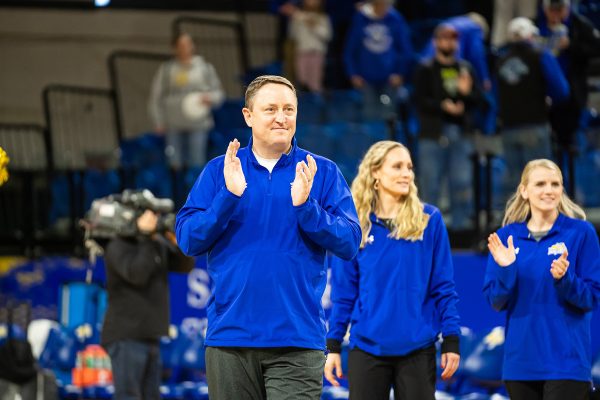History, legacy of Hobo Day continues
June 11, 2016
Hobo Day was brought to Brookings by a man named R. Adams Dutcher. However, the idea was not his own.
In 1911, Dutcher visited the University of Missouri and noticed they had a peculiar homecoming tradition. The celebration the Mizzou students attempted was not popular among the student body, so they moved onto a different tradition. Dutcher had the brilliant idea to bring the failed Mizzou celebration to South Dakota State University to see if it would take hold.
Prior to our beloved Hobo Day celebration, SDSU practiced a different homecoming event called the Nightshirt Parade. Students, dressed in their nightgowns, would parade down to the railyard to meet the opposing football team as they came in Friday night on the late train.
At the time, it was considered a bit too scandalous for women to be out in their nightgowns in the middle of the night. Dutcher proposed a new homecoming tradition, Hobo Day. The new idea was a great fit, and Hobo Day has been SDSU’s homecoming tradition ever since.
Another tradition almost as old as Hobo Day itself is the Bummobile. The Bummobile was a gift to the university in 1937 by Frank Weigel. Weigel was from Flandreau, South Dakota and did not attend SDSU, but he was a huge fan of Hobo Day and the university.
Since 1937, the Bummobile has been in every single Hobo Day parade. The Hobo Day Committee spreads hobo cheer by taking the Bummobile on a summer parade tour through many South Dakota towns.
One other unique tradition to Hobo Day is the term Grand Pooba, the leader of the Hobo Day Committee. The title actually comes from the television show, The Flintstones. The committee adopted this unique title to fit in with the uniqueness of Hobo Day.
The entire tradition started with students dressing like hobos, who could often be seen jumping on trains down at the railyard.
Hobo Day is not making fun of hobos, bums or homeless people. Hobo is not a derogatory word. It originates from the term “homeward bound.” It was first used right after the Civil War when thousands of soldiers were trying to make their way back home. They were called “hobos” as they used any means necessary to get back to their families.
Hobo is now used to describe someone who wanders from place to place, constantly searching for new challenges and adventures. We, the Committee, hope to instill this in students. Having a sense of adventure as they make their way through some of the best years of their life. Getting out of their comfort zone and trying new things.
All of this ties into our theme this year, Living the Legacy. We want students and alumni to get connected with the rich history of Hobo Day while creating new memories that they can hold onto forever.
Hobo Day is Oct. 22, and we cannot wait to continue living the legacy with all Jackrabbit fans.
























